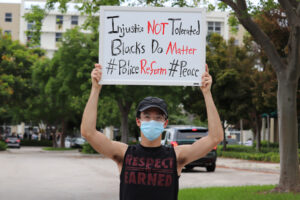
Young Americans with picket signs, bullhorns and face masks have flooded thousands of streets nationwide as protests against racism increase and the coronavirus pandemic continues to surge.
The rest of the world is tuned in now, more than ever.
George Floyd’s graphic death on Memorial Day in Minneapolis over a counterfeit $20 bill brought the world into an uproar as viral footage showed former police officer Derek Chauvin pressing his knee into Floyd’s neck for 8 minutes and 46 seconds. Since then, young activists have taken over social media with calls for justice.
Jasmine Hudson is a FAMU student who co-led a march on May 29 that attracted about 150 people to downtown Tallahassee. Though challenging, she said she enjoyed the responsibility and the help she received from people who wished to donate, join the conversation or march with her and her peers.
“We stayed out all day and night, making sure our voices were heard. We marched through the streets. We had people parking their cars to come join us,” she said.
On June 12, Jean Qian, a 16-year-old student activist, co-led a Black Lives Matter rally with her peers in Weston, in Broward County. The South Florida protest that attracted about 300 people started as a group chat between a few teenage friends. Qian considers the large turnout a testament to the impact of team-working and the influence of COVID-19.
“The effects of COVID have meant that many are no longer occupied with the things that used to take up time in their days. Far more attention is being paid to social media and current events,” Qian said.
She continued, “While I wish it were a long-standing thing, the surge in support for Black Lives Matter may be attributed to the new phenomenon where people can self-reflect and do the necessary thinking when it comes to viewing racism.”
The virus led the country to shut down beginning in mid-March. There are now more than 2.5 million coronavirus cases in the U.S. and as per the World Health Organization, the number of global cases has surpassed 10 million.
Tommy Guzman, 21, participated in a Black Lives Matter demonstration in South Florida. He said the coronavirus is no match for the fight against racism, prejudice and police reform.
“These protests matter so much more than COVID-19 because it involves people and lives matter more than a sickness that could possibly come when right now, there are lives that are dying,” said Guzman, who is a student at Nova Southeastern University.
Hudson said over the years, too many African Americans have become victims of American injustice, especially in the prison system. The real way to change, she said, is to dismantle and abolish current policies and adopt new ones that benefit all people. It is the spirit of her ancestors that fuels her bravery and motivation to fight at this time, she said.
“This fight matters because if we don’t advocate for change now, who will do it later? If our kids have to do it later, I truly would feel like we failed them,” the senior psychology major said.
Congresswoman Marcia Fudge gave an ode to the nation’s youth in a virtual town hall hosted by the NAACP.
“I think we are at a point, as young people are saying today, that we need to re-evaluate how we police our communities, especially as a need for social services goes up,” Fudge said. “As a former mayor, I know how much they spend on police and fire, so I think it is important that we do listen to what they are saying.”
Emma Rose Smith, one of six teenagers who led 10,000 people in a peaceful protest on June 4 in Nashville, Tennessee, said people of any age, race, creed, sexual orientation or gender identity could join this fight alongside the Black community.
“No matter what age you are, you can make a difference. As long as you use your voice to advocate for change, people will hear you. Put your ideas out there and people will come to you,” she said.